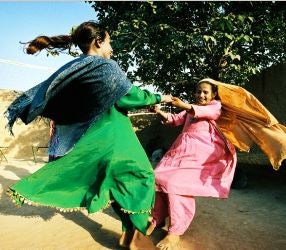
This fall, Morrison, along with a group of Recreation and Leisure Studies students will attempt to give children in developing and war-torn countries a vital piece of childhood back when they launch an official chapter of Right To Play at Waterloo.
The international organization relies on teams of volunteers and coaches in 24 countries to implement play-based programs designed with the dual purpose of letting kids be kids, and teaching them essential life skills needed to overcome challenges affecting their communities.
Play still a luxury for millions of kids
“Despite being classified as a basic human right by the United Nations, the right to play is still a luxury for millions of children,” explains Morrison. “Whether they can’t play because they need to work to support their families or because they live in conflict-ridden communities, it really is a luxury for them.”
The concept behind Right To Play is simple: use sport and games to give children the opportunity to actively engage with each other while simultaneously educating them on real-world challenges like protecting against disease or resolving conflict to create peaceful communities.
The idea of using sport for development is not new and can be traced back to Olympic roots where sport was used to establish peace between warring states. The role of sport as a vehicle for achieving peace and sustainable development is now recognized as a movement within the United Nations and is the focus of a growing body of research in sport sociology and management
“Sport for development tailors programs to each place’s context and need, whether it’s health concerns, lack of education, or a need for peace,” says Katie Misener, a professor in Recreation and Leisure Studies. “It’s using play as a powerful tool for personal and social growth while being mindful of the power and politics involved.”
First chapter at Waterloo
With one of the largest Recreation and Leisure Studies programs in the country, it seems only fitting that Right to Play have a presence on the Waterloo campus.
“So much of what we learn as Recreation students is embodied in the organization. This is a really meaningful way to impact people’s lives through leisure,” says Morrison, who hopes to recruit student volunteers to help with raising awareness about Right To Play on campus and organizing a public event.
While Right to Play focuses most of its efforts on developing countries and those affected by conflict, it also runs programs in Canada and the United States.
“There are communities in North America struggling with poverty and conflict. It doesn’t matter where the community is located; it’s about giving children back their fundamental right—the chance to play.”
Students interested in joining the chapter should email righttoplayuwaterloo@gmail.com.